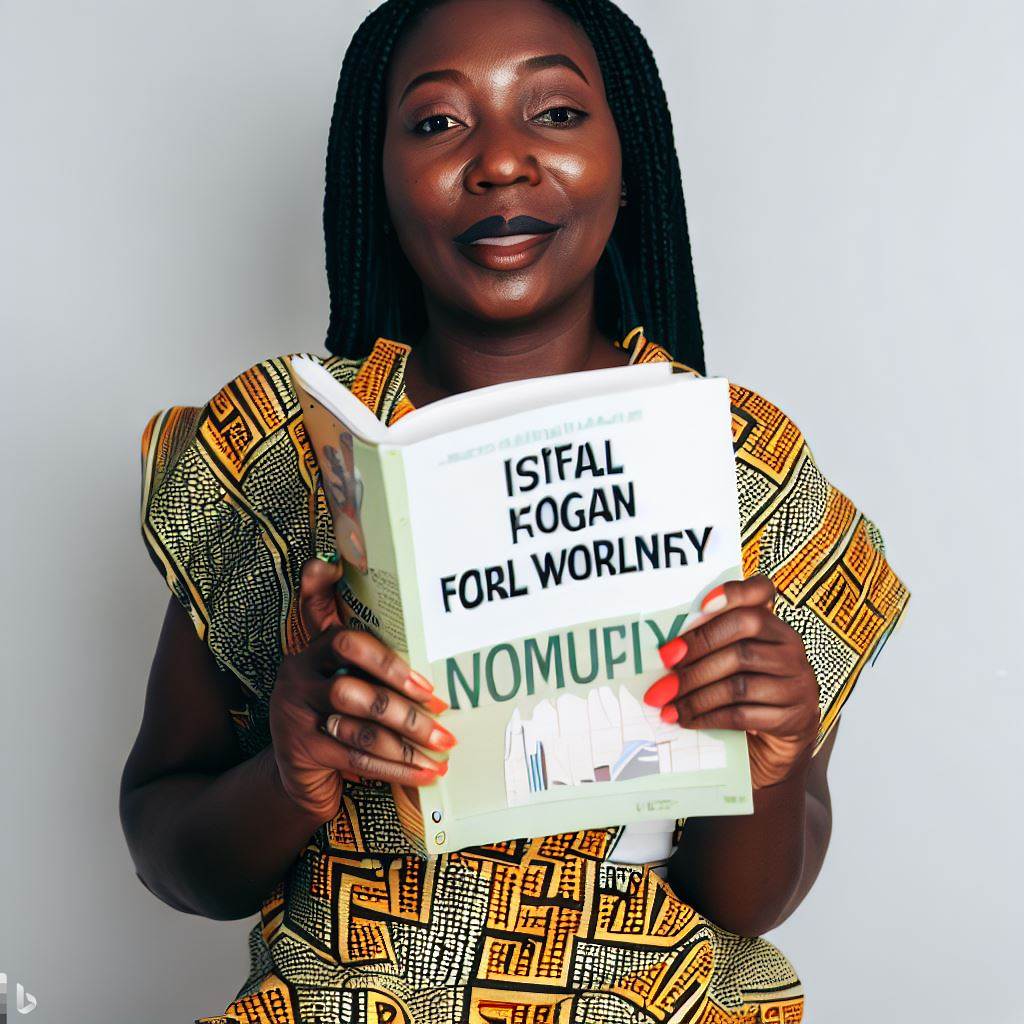Financial Literacy for Women: A Nigerian Focus
Last Updated on August 24, 2023
Introduction
A. Importance of Financial Literacy for Women
Financial literacy empowers women. It fosters independence, enhances decision-making, and boosts economic stability.
Bridging the gender financial literacy gap is vital. Nigerian women face unique financial challenges that demand attention.
B. Need for a Specific Focus on Nigerian Women
Nigeria, a diverse nation, requires tailored financial literacy approaches. Culture, economy, and gender dynamics vary significantly.
C. Overview of the Blog Post
This blog will dissect the financial literacy landscape for Nigerian women. We’ll explore challenges, strategies, and success stories.
Current Financial Landscape in Nigeria
A. Gender disparities in financial inclusion
- Women in Nigeria face significant challenges when it comes to financial inclusion.
- They have limited access to formal financial services, such as banking and insurance.
- The gender gap in financial inclusion hinders women from participating fully in economic activities.
- This disparity is partly due to cultural norms and discriminatory practices that limit women’s financial autonomy.
- Lack of financial literacy among women is another factor contributing to this gender disparity.
B. Women’s participation in the formal economy
- Women’s participation in the formal economy in Nigeria is lower compared to men.
- They often work in the informal sector, where limited financial opportunities exist.
- Women are less likely to have access to credit and loans to start or grow their businesses.
- Limited financial inclusion negatively affects women’s ability to generate income and accumulate savings.
- This further perpetuates their economic dependence on men and limits their financial independence.
C. Factors contributing to financial barriers for women in Nigeria
- Limited financial education and awareness among women contribute to their financial barriers.
- Lack of access to financial services, especially in rural areas, hinders women from utilizing financial tools.
- Social norms and cultural beliefs discourage women from actively engaging in financial transactions.
- Gender-based violence and discrimination also limit women’s ability to make financial decisions.
- Insufficient legal and policy frameworks to protect women’s financial rights exacerbate the problem.
The current financial landscape in Nigeria presents significant challenges for women’s financial literacy and inclusion.
Gender disparities in financial inclusion, limited women’s participation in the formal economy, and various factors contributing to financial barriers hinder women’s financial empowerment.
To address these issues, efforts are needed to improve financial literacy among women, expand access to formal financial services, challenge discriminatory practices, and create supportive legal frameworks.
By promoting financial literacy for women, Nigeria can empower its female population and enhance overall economic development and gender equality.
Read: Financial Literacy: Bridging the Gap in Nigeria
Understanding Financial Literacy: Building Strong Foundations
A. Definition and Components of Financial Literacy
- Grasp fundamental financial concepts like budgeting, saving, and investing for a solid financial foundation.
- Develop skills in managing personal finances, including debt management and effective budget allocation.
- Cultivate the ability to make informed financial decisions through critical thinking and analytical skills.
B. Importance of Financial Literacy for Women
1. Empowerment and Autonomy
- Financial literacy empowers women to take control of their financial destinies.
- Knowledge of financial concepts fosters confidence in managing money matters independently.
2. Economic Security and Wealth Creation
- Women equipped with financial literacy are better equipped to face economic challenges.
- Smart investment decisions result in long-term wealth accumulation and financial security.
3. Impact on Overall Well-being
- Financially literate women experience reduced stress related to money management.
- Improved financial well-being positively influences mental and emotional health.
In Nigeria, the call for enhanced financial literacy among women echoes loudly.
Equipping them with basic financial knowledge and skills is pivotal.
Through understanding key concepts and developing practical abilities, women can confidently navigate the financial landscape.
This proficiency stretches beyond individual benefits; it extends to societal progress.
Financial literacy empowers women, granting them the autonomy to make decisions aligned with their aspirations.
As they grasp budgeting, saving, and investing, they break free from financial constraints. Economic security blooms as women leverage their skills to create wealth.
Informed choices lead to bountiful futures.
Crucially, financial literacy ripples into overall well-being.
Stress linked to financial uncertainty diminishes, replaced by a sense of control and optimism.
Mental and emotional health flourishes when financial matters are managed with finesse.
Basically, the essence of financial literacy for Nigerian women cannot be overstated.
Basic financial knowledge, coupled with adept skills, paves the way for independence, security, and holistic well-being.
As women embrace these principles, a brighter, empowered Nigeria emerges.
Read: Decoding Taxes: A Financial Literacy Guide for Nigeria

Challenges Faced by Nigerian Women Regarding Financial Literacy
A. Limited access to financial education
- Sparse workshops, limiting knowledge acquisition.
- Few online resources, hindering self-paced learning.
- Inadequate school curriculum, missing foundational financial lessons.
B. Cultural and societal constraints
- Traditional gender roles stifle women’s financial independence.
- Taboos on women’s involvement in financial matters persist.
- Social pressure to prioritize family over personal financial growth.
C. Lack of tailored financial resources for women
- Scarce investment options addressing women’s needs.
- Insufficient financial planning tools sensitive to women’s goals.
- Few mentors guiding women through financial intricacies.
D. Gender pay gap and income disparities
- Women earn less for equivalent work, limiting savings.
- Unequal opportunities hinder wealth accumulation.
- Pay gap extends into retirement, affecting post-work life.
Nigerian women face multifaceted challenges in achieving financial literacy.
Limited educational access, cultural boundaries, tailored resources scarcity, and gender-based income disparities collectively hinder their financial empowerment.
Addressing these obstacles requires a comprehensive approach involving inclusive education, cultural shifts, customized financial services, and initiatives to bridge the income gap.
Empowering women financially contributes not only to individual well-being but also to the nation’s economic growth and stability.
Read: Why Financial Literacy Matters for Nigerians
Initiatives Driving Financial Literacy for Women in Nigeria
In Nigeria, efforts to enhance financial literacy among women are gaining momentum through various avenues.
These initiatives, led by different sectors, reflect a commitment to empower women economically and socially.
A. Government-led programs and policies
- Introduction of Financial Education in Schools: The Nigerian government recognizes the importance of early financial education. Schools now incorporate basic financial concepts into curricula, fostering a culture of money management from a young age.
- Women-Focused Entrepreneurship Programs: Government-backed initiatives offer training, funding, and mentorship for aspiring female entrepreneurs. These programs equip women with business skills, promoting self-sufficiency and economic independence.
B. Non-profit organizations and NGOs empowering women financially
- Skills Training Workshops: Non-profits conduct workshops on financial planning, investment, and budgeting. These sessions equip women with practical skills to navigate the complexities of personal finance.
- Microfinance and Microcredit Services: NGOs collaborate with microfinance institutions to provide women with access to small loans and financial services. This fosters entrepreneurship and enables women to generate income.
C. Private sector initiatives and partnerships
- Specialized Financial Services: Forward-thinking financial institutions create tailored products addressing the unique financial needs of women, such as savings accounts with higher interest rates or flexible loan options.
- Corporate Social Responsibility Programs: Private companies initiate programs that promote financial education. By partnering with experts, they offer workshops, seminars, and online resources to enhance women’s financial knowledge.
Collectively, these initiatives mark a significant stride towards bolstering financial literacy among women in Nigeria.
Government commitment, non-profit dedication, and private sector innovation synergize to pave the way for a financially empowered female population.
As these efforts persist, the trajectory of women in Nigeria’s economy is poised for a positive transformation.
Read: The Role of Financial Literacy in Nigeria’s Economy
Tips for Enhancing Financial Literacy among Nigerian Women
Financial literacy is crucial for everyone, regardless of gender.
However, in many societies, including Nigeria, women often face unique challenges when it comes to managing their finances.
Societal norms, cultural expectations, and limited access to financial resources can hinder a woman’s ability to achieve financial independence and security.
To overcome these barriers and empower Nigerian women with financial literacy, various strategies can be adopted.
A. Educating oneself through self-study
One effective way for Nigerian women to enhance their financial literacy is through self-study.
This involves actively seeking out resources and educational materials to increase knowledge and understanding of financial concepts.
Reading financial books and resources can provide insights into personal finance, investing, and wealth creation.
Additionally, participating in online financial courses allows women to acquire practical skills and strategies to apply in real-life situations.
B. Seeking guidance from financial professionals or mentors
Another valuable step is seeking guidance from financial professionals or mentors who have expertise in the field.
These individuals can offer personalized advice and support, helping Nigerian women make informed decisions about their finances.
Whether it’s consulting with a financial advisor or connecting with a mentor, having someone knowledgeable to turn to can provide clarity and confidence in financial matters.
C. Creating a budget and setting financial goals
A crucial aspect of financial literacy is the ability to budget effectively and set clear financial goals.
Nigerian women can benefit from creating a budget that outlines their income, expenses, and savings.
This practice helps track spending habits, identify areas for improvement, and ensure financial stability.
Setting financial goals, such as saving for education, starting a business, or buying a house, provides a sense of purpose and motivation to stay on track.
D. Building savings and investment habits
Building savings and investment habits is vital for long-term financial security.
Nigerian women should prioritize saving a portion of their income regularly.
This can be done by automating savings, making it easier to stay consistent.
Additionally, exploring investment opportunities can help grow wealth and generate passive income.
Understanding the basics of investing and seeking advice from professionals can empower women to make informed choices that align with their financial goals.
E. Embracing entrepreneurship and financial independence
Entrepreneurship offers Nigerian women the opportunity to gain financial independence and control over their finances.
Starting a business can provide additional income streams and a platform for personal and professional growth.
By embracing entrepreneurship, women can overcome limitations imposed by societal norms and achieve financial empowerment on their terms.
In general, enhancing financial literacy among Nigerian women is essential for their economic empowerment and overall well-being.
By educating themselves through self-study, seeking guidance from experts, creating budgets and setting financial goals, building savings and investment habits, and embracing entrepreneurship, women can gain the necessary knowledge and skills to make informed financial decisions.
This, in turn, will contribute to their financial independence, security, and overall success.
Conclusion
Financial literacy is crucial for women in Nigeria to empower themselves and secure their future.
Through knowledge of personal finance, women can make informed decisions and avoid financial pitfalls.
It is imperative that efforts to promote financial literacy among women in Nigeria be intensified.
This can be achieved through educational programs, workshops, and accessible resources to provide women with the necessary information and skills to manage their finances effectively.
Women in Nigeria should take control of their financial future by developing a strong understanding of financial concepts, such as budgeting, saving, and investing.
By doing so, they can overcome financial challenges, achieve financial independence, and contribute to the overall development of Nigeria.
Lastly, financial literacy plays a crucial role in empowering women in Nigeria.
By understanding personal finance and taking control of their financial future, women can overcome financial limitations, make informed decisions, and achieve their goals.
It is essential to continue promoting financial literacy efforts to ensure every woman in Nigeria has the necessary knowledge and resources to achieve financial independence.
Let’s empower women, transform lives, and build a prosperous future for all.


